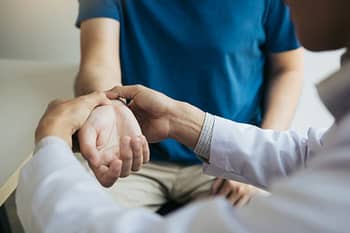Treating TFCC Tears
Many TFCC tears conditions can be treated through conservative methods, but some may require surgery to effectively relieve pain and restore function to the joint. Your doctor will decide which type of treatment is best for you after a thorough evaluation of your condition. Contact Us TodayTreating TFCC Tears in Wayne, NJ
Your triangular fibrocartilage complex (TFCC) is a structure in the wrist comprising connective fibers and cartilage. When it tears, pain and weakness can result. High Mountain Orthopedics treats TFCC tears and other hand and wrist injuries for patients in and around Wayne, New Jersey. Our team is composed of skilled, compassionate orthopedic specialists and surgeons who are all committed to helping you achieve full recovery.
Understanding TFCC Tears
The TFCC serves an essential role in supporting and stabilizing the wrist joint. It also cushions bones and prevents them from rubbing against one another. While the TFCC is a durable piece of tissue, it can sometimes tear, frequently resulting in symptoms such as:
- Pain in the wrist below the pinkie finger
- Pain that increases when bending the wrist
- A clicking or popping sensation
- Inflammation and swelling
- Weakness or limited range of motion
While the TFCC may not cause any immediate discomfort, symptoms can develop over time. Many of these signs are also associated with other wrist injuries. If you’re experiencing pain or weakness in your wrist, speak with a doctor at High Mountain Orthopedics for a correct diagnosis and effective treatment plan.
Causes and Risk Factors
TFCC tears can have one of two causes. Because of this, doctors have divided the condition into two types based on the injury’s origin, including:
Type 1 TFCC Tears
Type 1 tears are caused by a sudden injury that forces your wrist to twist beyond its natural range. This might be the result of falling and catching yourself on an outstretched arm, a work-related incident, or any other unnatural twisting.
Type 2 TFCC Tears
Type 2 tears are caused by wear-and-tear. This is frequently related to an underlying condition causing cartilage in the TFCC to break down, like rheumatoid arthritis or gout. Other Type 2 tears are related to accumulated damage from overuse in a job or sport.
TFCC tears are most common in athletes, especially those who frequently rotate or put pressure on wrists, such as tennis players, catchers, and gymnasts. The same is true in workplaces that require similar movements. Previous wrist injuries can also increase a patient’s risk of tearing their TFCC.
Our Treatments for TFCC Tears
When a patient comes to High Mountain Orthopedics with a TFCC tear, our first recommendation is rest. By temporarily ceasing activities that cause wrist pain, you may give your injury time to heal naturally. Our doctors may also prescribe the use of a splint to aid in recovery. Rest is typically followed by several weeks of physical therapy to restore strength and improve range of movement. Physical therapy also retrains the wrist to move in safer ways, reducing the risk of future re-injury.
If rest and physical therapy are not successful, the next step is surgery. Our surgeons make use of an arthroscope to offer minimally invasive procedures for both Type 1 and Type 2 tears. Doctors will repair the damaged sections of the TFCC, and then place the wrist in a cast to keep it stable for about six weeks following the procedure. Patients may be prescribed a round of physical therapy once the cast is removed.
Choose High Mountain Orthopedics
If you or your loved one has recently suffered a hand or wrist injury, contact High Mountain Orthopedics right away. Serving our region from locations in Wayne, NJ, our patients are always greeted with a compassionate, welcoming atmosphere and the latest advancements in orthopedic medicine. Schedule your first appointment today to begin your recovery.

Hand & Wrist Treatment Specialties
Schedule An Appointment Today!
If you or someone you know is in pain, we can help. Take the first step and schedule an appointment.
